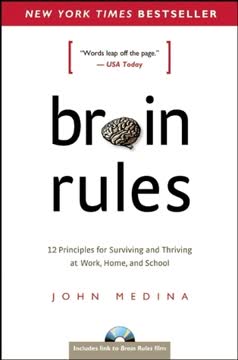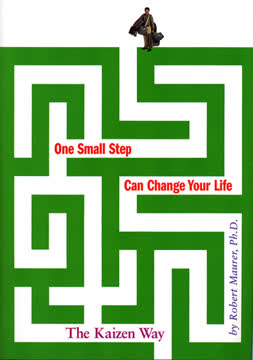Key Takeaways
1. Kaizen: The Power of Small Steps for Big Change
"All changes, even positive ones, are scary. Attempts to reach goals through radical or revolutionary means often fail because they heighten fear. But the small steps of kaizen disarm the brain's fear response, stimulating rational thought and creative play."
Kaizen philosophy. Kaizen, a Japanese term meaning "continuous improvement," offers an alternative to drastic change. It involves making small, incremental improvements that accumulate over time to create significant transformations. This approach is rooted in post-World War II American management practices and was later adopted and refined by Japanese businesses.
Benefits of small steps. By focusing on tiny, manageable changes, kaizen helps individuals and organizations:
- Bypass the fear and resistance often associated with big changes
- Build new habits gradually and sustainably
- Achieve goals that might seem overwhelming when viewed as a whole
- Maintain motivation and momentum throughout the change process
Real-world applications. Kaizen has been successfully applied in various contexts, from manufacturing and business management to personal development and health improvement. For example, a person trying to establish an exercise habit might start by marching in place for one minute while watching TV, gradually increasing the duration and intensity over time.
2. Overcoming Fear: How Kaizen Bypasses the Brain's Resistance
"The fight-or-flight response makes a lot of sense. If a lion is charging at you, the brain does not want you to waste time carefully thinking through the problem. Instead, the brain simply shuts down nonessential functions, such as digestion, sexual desire, and thought processes, and sends the body directly into action."
Brain's fear response. The human brain is wired to resist change, activating the fight-or-flight response when faced with new challenges or opportunities. This response, controlled by the amygdala, can impede rational thinking and creative problem-solving, making it difficult to pursue goals or implement changes.
Kaizen's neurological advantage. Small steps of kaizen work by:
- Avoiding triggering the amygdala's alarm system
- Allowing the cortex (the thinking part of the brain) to remain engaged
- Gradually creating new neural pathways for desired behaviors
- Building confidence through small successes
Practical application. When attempting to make a change, start with steps so small they seem trivial. For instance, if you want to develop a meditation habit, begin by sitting quietly for just one minute a day. This approach helps circumvent the brain's natural resistance to change and allows for gradual, sustainable progress.
3. Ask Small Questions to Spark Creativity and Problem-Solving
"Questions ("What is the color of the car parked next to yours?") turn out to be more productive and useful for shaping ideas and solutions than commands ("Tell me the color of the car parked next to yours.")."
Power of questions. Small, gentle questions engage the brain without triggering fear or resistance. They encourage creative thinking and problem-solving by:
- Stimulating curiosity and playfulness
- Allowing the brain to process information without pressure
- Encouraging exploration of new possibilities
Effective questioning techniques:
- Ask open-ended questions that don't have obvious answers
- Focus on small, specific aspects rather than overwhelming big-picture issues
- Repeat questions over time to allow for deeper reflection and insights
Practical examples. Instead of asking, "How can I lose 50 pounds?" try "What's one small thing I could do today to be healthier?" Or in a business context, replace "How can we double our profits?" with "What's one tiny improvement we could make to our customer service?"
4. Mind Sculpture: Harness the Power of Mental Rehearsal
"Within minutes of "practicing" a task mentally, using all your senses, the brain's chemistry begins to change. It rewires its cells and the connections between the cells to create complex motor or verbal skills."
Concept of mind sculpture. Mind sculpture is a technique that involves mentally rehearsing an action or skill using all senses. Unlike traditional visualization, which primarily engages the visual cortex, mind sculpture activates multiple areas of the brain, creating a more comprehensive mental experience.
Benefits and applications:
- Improves performance in sports, public speaking, and other skills
- Helps overcome fears and anxieties related to specific situations
- Builds confidence and familiarity with new tasks or environments
- Can be used to practice responses to challenging scenarios
Practical steps for mind sculpture:
- Choose a specific task or situation to rehearse
- Find a quiet, comfortable place to practice
- Close your eyes and imagine the scenario in vivid detail
- Engage all senses: sight, sound, smell, touch, and taste
- Mentally perform the action, focusing on desired outcomes
- Practice regularly, starting with short sessions and gradually increasing duration
5. Small Actions: The Heart of Kaizen for Lasting Change
"Small actions take very little time or money, and they are agreeable even to those of us who haven't laid up bulk supplies of willpower. Small actions trick the brain into thinking: Hey, this change is so tiny that it's no big deal. No need to get worked up. No risk of failure or unhappiness here."
Power of small actions. The core of kaizen lies in taking small, consistent actions towards a goal. These tiny steps:
- Require minimal time, effort, or resources
- Bypass the brain's fear response
- Build momentum and create new habits over time
- Lead to significant changes when consistently applied
Examples of small actions:
- Flossing one tooth per day to build a dental hygiene habit
- Standing on a treadmill for one minute to start an exercise routine
- Writing three sentences daily to develop a writing practice
- Removing one bite of food from your plate to practice portion control
Implementation strategy. When implementing small actions:
- Choose an action so small it seems almost ridiculous
- Commit to performing this action daily
- Gradually increase the action as it becomes habitual
- Be patient and trust the process of incremental change
6. Solving Small Problems to Prevent Major Crises
"Focusing on the small mistakes now can save us years of costly corrections."
Importance of early problem-solving. Addressing small issues before they escalate can prevent major crises in both personal and professional contexts. This approach:
- Saves time, resources, and emotional energy in the long run
- Maintains stability and prevents disruptions
- Fosters a culture of continuous improvement
Key strategies:
- Develop awareness of small warning signs
- Encourage open communication about potential issues
- Implement systems for regular check-ins and evaluations
- Take prompt action on identified problems, no matter how minor they seem
Real-world example. Toyota's manufacturing process allows any worker to stop the production line if they notice a defect, no matter how small. This approach has led to significant improvements in quality and efficiency, demonstrating the power of addressing small problems immediately.
7. Small Rewards: Nurturing Intrinsic Motivation for Success
"The larger the external rewards, the greater the risk of inhibiting or stunting the native drive for excellence."
Psychology of rewards. Small rewards are more effective than large ones in promoting lasting change and motivation. They:
- Preserve intrinsic motivation and the natural desire for excellence
- Provide recognition without overshadowing the task itself
- Encourage consistent effort rather than one-time achievements
Characteristics of effective rewards:
- Appropriate to the goal and the individual
- Free or inexpensive
- Immediate and consistent
- Focused on recognition rather than material gain
Examples of small rewards:
- A sincere compliment or word of appreciation
- A short break to enjoy a favorite activity
- A small token of recognition, like a handwritten note
- Extra time for a enjoyable personal pursuit
8. Appreciating Small Moments: The Key to Excellence and Breakthroughs
"Jenner's story gives the lie to a popular idea that change and progress springs from instantaneous flashes of in-sight. Instead, innovation depends on close, continual observation."
Value of small moments. The kaizen approach emphasizes the importance of noticing and appreciating small details and everyday occurrences. This mindset:
- Cultivates awareness and presence in daily life
- Uncovers opportunities for improvement and innovation
- Strengthens relationships through increased attentiveness
- Leads to unexpected insights and breakthroughs
Developing appreciation for small moments:
- Practice mindfulness in daily activities
- Keep a journal of small observations or gratitudes
- Take time to reflect on seemingly insignificant events
- Engage fully in conversations and interactions with others
Historical example. Edward Jenner's discovery of the smallpox vaccine came from noticing that milkmaids were resistant to the disease. This observation, easily overlooked by others, led to a revolutionary medical breakthrough, illustrating the power of paying attention to small details.
Last updated:
FAQ
What's "One Small Step Can Change Your Life: The Kaizen Way" about?
- Overview: The book by Robert Maurer introduces the concept of Kaizen, a Japanese technique for achieving personal and professional goals through small, incremental steps.
- Focus on Small Steps: It emphasizes the power of taking small, manageable actions to create lasting change and overcome fear and resistance.
- Historical Context: The book explains how Kaizen was used by Japanese corporations to achieve excellence and how it can be applied to personal life.
- Practical Application: It provides strategies for implementing Kaizen in various aspects of life, such as health, relationships, and career.
Why should I read "One Small Step Can Change Your Life: The Kaizen Way"?
- Achieve Lasting Change: The book offers a practical approach to making changes that stick, which is beneficial for anyone looking to improve their life.
- Overcome Fear and Resistance: It provides insights into how small steps can bypass the brain's fear response, making change less daunting.
- Versatile Application: The principles of Kaizen can be applied to a wide range of personal and professional goals, making it a valuable read for diverse audiences.
- Inspiration and Motivation: Through real-life examples and success stories, the book inspires readers to take action and believe in their potential for continuous improvement.
What are the key takeaways of "One Small Step Can Change Your Life: The Kaizen Way"?
- Small Steps Lead to Big Change: Incremental actions can lead to significant improvements over time, making daunting goals more achievable.
- Bypass Fear: Small steps help to avoid triggering the brain's fear response, allowing for more rational and creative thinking.
- Continuous Improvement: Kaizen encourages a mindset of ongoing development, rather than seeking quick fixes or radical changes.
- Practical Techniques: The book offers specific strategies, such as asking small questions and taking small actions, to implement Kaizen in daily life.
How does Robert Maurer define Kaizen in the book?
- Definition: Kaizen is defined as a strategy for continuous improvement through small, incremental steps.
- Historical Roots: It originated in Depression-era America and was later adopted by Japanese businesses to enhance productivity and quality.
- Philosophical Approach: Kaizen emphasizes the importance of small, consistent actions over time, rather than drastic changes.
- Application: It can be applied to both personal and professional goals, helping individuals and organizations achieve excellence.
What are some practical examples of Kaizen from the book?
- Exercise Routine: The book describes how a woman started exercising by marching in place for one minute a day, gradually increasing her activity level.
- Dietary Changes: It suggests starting with small dietary changes, like removing one bite of a snack, to develop healthier eating habits.
- Workplace Improvements: Kaizen can be used in the workplace by encouraging employees to suggest small improvements, leading to increased efficiency and morale.
- Personal Relationships: The book illustrates how small gestures and consistent positive attention can strengthen relationships.
How does "One Small Step Can Change Your Life" address overcoming fear?
- Understanding Fear: The book explains that fear is a natural response to change, rooted in the brain's physiology.
- Small Steps Strategy: By taking small, non-threatening actions, individuals can bypass the brain's fear response and make progress toward their goals.
- Building Confidence: Small successes build confidence and reduce resistance, making it easier to tackle larger challenges over time.
- Practical Techniques: Techniques like asking small questions and mind sculpture help to reduce fear and encourage creativity.
What is the role of small questions in Kaizen, according to Robert Maurer?
- Engage the Brain: Small questions engage the brain without triggering fear, allowing for creative problem-solving.
- Incremental Progress: They help break down large goals into manageable parts, making it easier to take action.
- Examples: Questions like "What is one small step I can take today?" can lead to meaningful change over time.
- Encourage Reflection: Small questions encourage reflection and self-awareness, helping individuals identify areas for improvement.
How does the book suggest using small rewards in the Kaizen process?
- Motivation: Small rewards provide motivation and recognition without overshadowing intrinsic motivation for improvement.
- Appropriate Rewards: The book emphasizes choosing rewards that are appropriate to the goal and the individual, ensuring they are meaningful.
- Cost-Effective: Small rewards are often inexpensive or free, making them accessible and sustainable.
- Encouragement: They serve as positive reinforcement, encouraging continued effort and progress.
What are some of the best quotes from "One Small Step Can Change Your Life" and what do they mean?
- "A journey of a thousand miles must begin with the first step." - This quote emphasizes the importance of starting small to achieve big goals.
- "When you improve a little each day, eventually big things occur." - It highlights the cumulative effect of small improvements over time.
- "All changes, even positive ones, are scary." - This acknowledges the fear associated with change and the need for strategies to overcome it.
- "No act of kindness, no matter how small, is ever wasted." - It underscores the value of small, positive actions in building relationships and achieving goals.
How does "One Small Step Can Change Your Life" apply Kaizen to personal relationships?
- Positive Attention: The book suggests that small, consistent gestures of positive attention can strengthen relationships.
- Daily Interactions: Simple actions like using a pleasant tone of voice or showing interest in a partner's day contribute to relationship success.
- Building Trust: Kaizen encourages building trust through small, everyday moments rather than grand gestures.
- Appreciation: Focusing on small, positive aspects of a partner helps maintain a healthy and loving relationship.
How can Kaizen be applied to health and wellness, according to the book?
- Incremental Changes: Start with small, manageable changes in diet and exercise to build healthier habits.
- Sustainable Habits: Small steps make it easier to sustain new habits over the long term, reducing the likelihood of relapse.
- Mindful Eating: Techniques like removing one bite of a snack can help develop portion control and mindful eating.
- Exercise Routine: Begin with minimal exercise, such as marching in place for a minute, and gradually increase activity levels.
What is the significance of identifying small moments in the Kaizen process?
- Creative Potential: Small moments can hold the seeds of important change and creative breakthroughs.
- Attention to Detail: Paying attention to small details can lead to significant improvements and innovations.
- Daily Boost: Recognizing and appreciating small moments can provide a daily boost toward excellence and satisfaction.
- Mindfulness: Cultivating awareness of small moments encourages mindfulness and a deeper appreciation of life.
Review Summary
One Small Step Can Change Your Life: The Kaizen Way presents the concept of kaizen, a method of making small, continuous improvements to achieve significant change. Readers appreciate the book's practical advice and real-life examples, finding it inspiring and applicable to various aspects of life. The approach of taking tiny steps to bypass fear and resistance resonates with many. While some criticize the book's repetitiveness and simplicity, most find it a valuable tool for personal growth and problem-solving. Overall, readers recommend it as an easy, motivating read for those seeking gradual but meaningful change.
Similar Books









Download PDF
Download EPUB
.epub digital book format is ideal for reading ebooks on phones, tablets, and e-readers.





